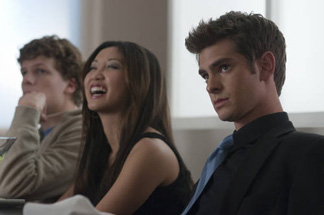Movie Review: The Social Network
By Matthew Huntley
October 12, 2010
BoxOfficeProphets.com

Of course, it’s incredibly difficult to watch a film like this as only entertainment and not as a docudrama on the creation of Facebook, the online social network now worth $25 billion. The fact that Facebook really exists makes the film all the more intriguing, but the good thing is it doesn’t rely on viewers’ knowledge of this to be engaging. Truth or no truth, The Social Network works as a film with rich, intelligent dialogue, complex characters and a dynamic rhythm. It also tells a thoughtful, absorbing story, which is what we want it do before it does anything else.
It all begins in the fall of 2003, when a smug, introverted college student named Mark Zuckerberg (Jesse Eisenberg) gets dumped by his girlfriend. Mark is a computer science major at Harvard who writes code like everyone else breathes air. He returns to his dorm and blogs derogatory comments about his ex before creating a website poll where visitors are asked to rate girls from surrounding schools based on their hotness. The 22,000 hits the site receives causes the Harvard network to crash and Mark is reprimanded by the college board, although he argues he deserves recognition for illustrating how vulnerable their system is. In a way, he has a point.
Word gets out about Mark’s computer wizardry and he’s soon recruited by twin brothers Cameron and Tyler Winklevoss (Armie Hammer) and Divya Narendra (Max Minghella) to work on an independent project. They ask him to help build and design an online social networking site called Harvard Connection. Mark says he’s in but weeks go by and they never hear from him, despite leaving him countless e-mails and phone messages. That’s because Mark and his best friend Eduardo (Andrew Garfield) are too busy building their own social networking site. Did Mark just steal the other students’ idea?
The film jumps around to different points in time, cross-cutting between Mark and Eduardo developing the site called The Facebook and to two different trials: one where Mark is being sued by the Winklevoss twins and Narendra; and another where he’s being sued by Eduardo himself. Each party basically claims the same thing: Mark is a thief and a traitor. Over the course of the film, it’s hard to disagree with them.
Aaron Sorkin’s snappy screenplay and Kirk Baxter and Angus Wall’s editing are masterful in the way they reveal so much information to us without a whole bunch of tedious explanation. The film is lean and moves fast, but it’s perfectly comprehensible, and we become immersed in its fast-paced world. I walked away feeling like I knew everything I needed to in a limited amount of time, which sort of mirrors Mark’s gift for programming a complex website in a week when it would have take an entire company years, at least according to Mark.
It goes without saying The Facebook spreads exponentially, not unlike a virus, and Mark and Eduardo begin selling it to other college campuses. At Stanford, it catches the attention of Sean Parker (Justin Timberlake), infamous to some as the founder of Napster. He’s not a student at Stanford; he’s just sleeping with one of the female students. A schmoozer and glorified car salesman, Parker becomes Mark’s business consultant and woos him with the idea of endless possibilities for the site. But the level-headed Eduardo can see through Parker’s B.S., as can we, and we witness a tragic shift in loyalty as Mark falls under the spell of greater power and starts to abandon more meaningful things like friendship.
But the question is whether Mark ever really cared about such things in the first place. One of the most intriguing aspects of the film is it never claims to know exactly how Mark Zuckerberg really feels or what he’s thinking. On the surface, he’s enigmatic and robotic and, on one level, we despise him for his flippant attitude toward other human beings; on another, we feel sorry for the kid because we realize he’s incapable of making any type of human connection, which makes him prone to loneliness and cynicism.
Jesse Eisenberg, an actor who has mostly played farcical, goofy characters, is eerily convincing as a jaded student whose attention span only goes as far as his computer screen. He convinces us Mark is a genius and makes him someone who’s easy to hate, yet just as easy to admire. The character is written and performed as someone whom we feel we’ll never truly know, which is why he’s so fascinating.
I have no idea how accurate The Social Network is and I really don’t care. I don’t go to dramatic features for the facts, but rather to feel and be affected by the drama and characters. That’s what this film does. Director David Fincher gives it a riveting, ominous tone throughout and although we don’t walk away feeling like we truly know who the inventor of Facebook is, the answer becomes less important to us as the film goes on. Instead, we reflect on the greater idea that technology has become intertwined with human nature and how we sometimes embrace things like Facebook for validation - to tell other people about ourselves and give us more purpose.
The other message I took from it is no matter how popular we become in the digital world, it can never replace real human contact. That’s probably why Mark Zuckerberg excelled at developing the site - he was so impassioned by his inability to connect to other people within a physical social network that he worked to create one where he made the rules. His energy and enthusiasm allowed him to make Facebook what it is today. There are a lot of people who are angry with him; but there are millions more who are grateful.